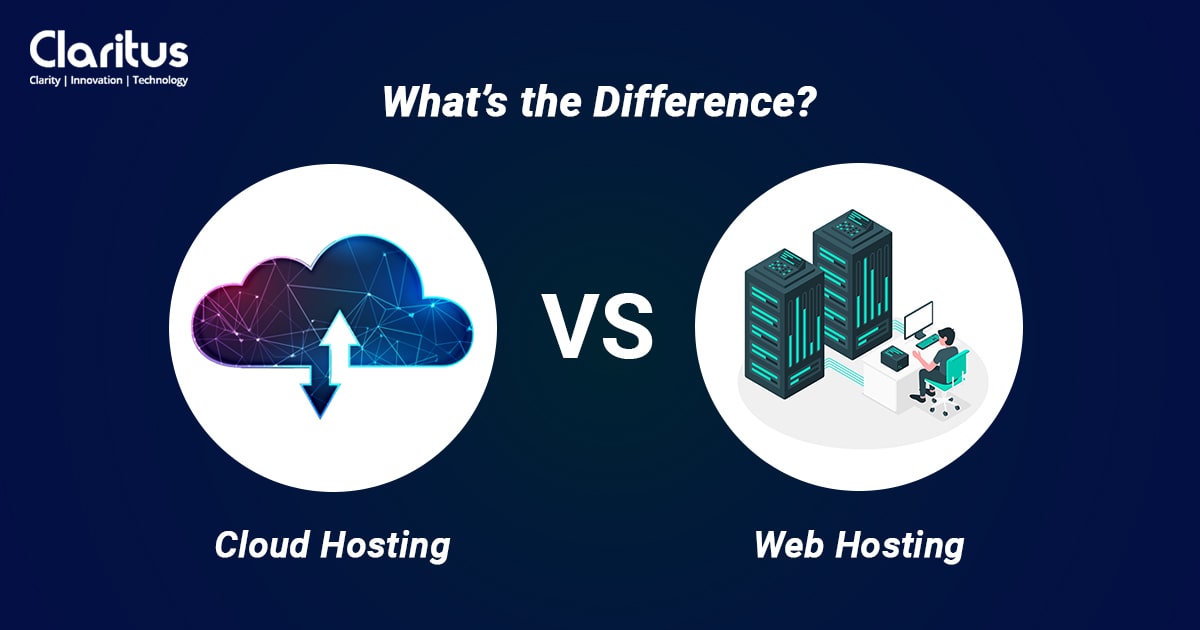Web Hosting vs. Cloud Hosting: What’s the Difference?

About Web Hosting
Web Hosting is actually a service which stores site files on a server and consists of all files of your website. Documents from your website are hosted on a special server. Web hosting helps to exhibit the site every time a user asks for your domain name. The browser goes on to download the documents from your web host server to display them to the user.
Traditionally, there are two kinds of web hosting available. They are, virtual or dedicated. In virtual type, an organization hosting a site purchases a specific amount of space on the server. Here, server resources are utilized concurrently by multiple web resources.
In dedicated type however, the site owner is required to pay for complete control of either a single or many servers. So here, it’s not necessary for you to share resources with other sites. It’s more expensive and requires special service.
About Cloud Hosting
Cloud Hosting is basically a storage occupying a virtual space, a virtual server to hold your website files. Here, you have no physical server and all your hardware is necessarily virtual. This service allows you to store data in several networked servers and access them from anywhere through the internet. In other words, “cloud” is a unique computing machine that has a humongous storage space and great power of processing.
It offers an endless extension of resources which is remarkable especially, if you have a website with exponential growth. Your website is protected also from servers with glitches, since you have an option to shift to a different server from a defective one.
In the last few years this evolved web hosting style has become extremely popular. Easy resource scalability has also been a reason for its fame.
The Differences between Web Hosting and Cloud Hosting
1. Web hosting gives you limited power and space and can be offered to a single or multiple users. Customarily, in the beginning, websites prefer shared hosting since it’s a more economical option. The management, security and support are taken care of by the organization which provides the services. This eliminates the burden of part of the work from the resource owner and the person does not need to be technically very proficient. Cloud hosting involves many virtualized servers which are matched and aligned with each other. This produces a balanced load.
2. Mostly, organizations provide supplementary services together with web hosting services. These can be free domain registration, automatic backups and others. This helps a newbie internet entrepreneur to get the required extensions and embellishments to the site and kickoff his web resource very fast.
Cloud hosting offers the customer root access to the control panel and assists in case disaster recovery becomes necessary. You can shift to a different server and keep working if errors crop up.
3. After some time you may need to scale up. With web hosting, you can attain your objectives by changing the service provider or your plan in case of strained resources. Cloud hosting, which is more flexible, does not necessitate a server restart while scaling and is possible at any time. Unlike web hosting, the distribution of resources in cloud hosting is accomplished without delay and you don’t need to pause and linger whatsoever.
4. Genuine and dependable web hosting providers safeguard your server from hostile and harmful activities. Protection is derivable against data hacking, which permits users to have their information intimate and hushed.
The preventive measures and protection include, SSL certificates, automatic scanning of software programmes for detection of viruses, diverse plug-ins and safeguards against spam and malwares. However, these measures notwithstanding, the cloud is still a winner as far as security is concerned. It’s way safer to store data in cloud. Together with measures mentioned above the cloud allows installing web application firewalls and possesses cutting-edge monitoring systems.
5. Cost and expenses depend on the web hosting provider. Actually, when you buy a web hosting, you are required to pay for fixed resources while in cloud hosting you simply pay for services that you have opted for.
Many a time organizations waste money by overpaying for unused assets while utilizing a web hosting service.
It’s not so, with cloud hosting. Due to its flexible payment system, in cloud you never overpay and unused space and resources are unshackled. Whether it is RAM or network bandwidth, here, you are permitted to link-up with any additional resource that you are in need of.
The assets are just a few clicks away. Finally, you blissfully end up paying for only the services you have put-to-use.
